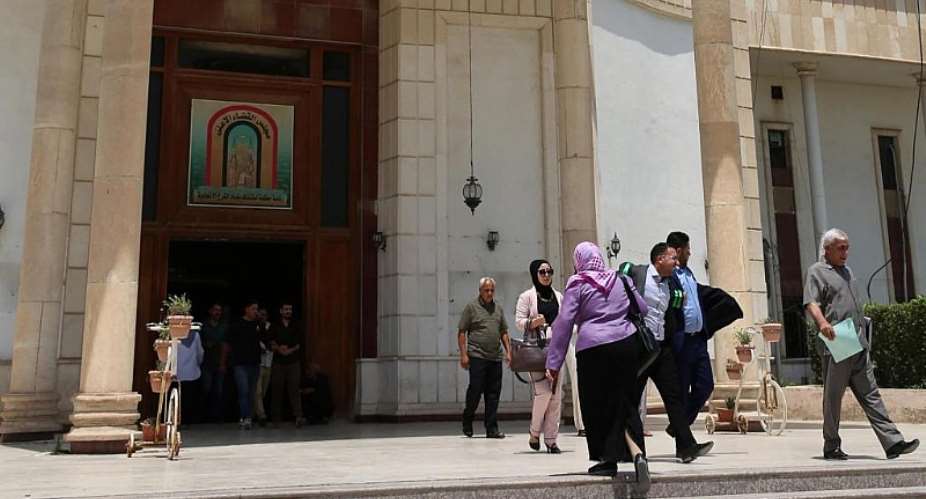An Iraqi court sentenced a seventh French citizen to death for joining the Islamic State armed group on Wednesday. Rights groups have hailed the French government's pledge to do more to prevent their executions, but some question its real commitment to doing so.
Yassin Sakkam was among 12 French citizens transferred to Iraq in January after being detained following a US-backed offensive against the remains of the Islamic State armed group “caliphate” in northeastern Syria.
Sakkam left France in 2014 to fight for the IS and French investigators had been seeking his arrest since 2016. He told the Iraqi court he regretted swearing allegiance to the IS and asked to be pardoned.
Iraqi courts are prosecuting thousands of alleged IS members, including hundreds of foreigners from France and other Western countries.
Sakkam's death sentence was the seventh handed to a French national since Sunday.
It came a day after French Foreign Affairs Minister Jean-Yves Le Drian said France was “multiplying efforts” to ensure capital punishment would not be applied to its citizens.
France has been adamant however that it would not seek their repatriation, arguing they should face justice in the countries where they were accused of crimes.
“We will not shift: fighters must be judged where they have committed crimes,” said Le Drian.
Seeking justice, not vengeance
Rights groups in France, one of many countries to have experienced the deadly violence of IS first-hand, supported the pledge by Paris to try and prevent capital punishment in the interest of accountability.
“We are asking for justice, and we think that asking for the death penalty is to ask for vengeance,” said Guillaume de Saint Marc, president of the French Association of Victims of Terrorism, who added that the lives of convicted jihadists had an interest in accountability.
“From experience with terrorist attacks, we know testimonies of perpetrators can be useful many years after their arrest, because investigators open new doors over time,” he said. “We need them to be still alive, to be able to be questioned.”
He also agreed the perpetrators should face justice in Iraq, rather than be repatriated to France, so long as French investigators can have access to them as well.
“That is the right of the victims,” he said. “They [the suspects] carried out murders and atrocities over there, so they have to face their own victims over there.”
Troubling questions of transfers
Complicating the French position, though, was the transfer of the suspects from northern Syria to Iraq, where the law upholds the death penalty for anyone found to have joined a “terrorist group”, whether they engaged in fighting or not.
“There's an inconsistency and even a certain amount of hypocrisy in the French position on these issues,” said Nadim Houry, director of the terrorism/counterterrorism programme at Human Rights Watch.
“We don't know the exact role that France played in that transfer, but it's hard to believe that the Syrian Democratic Forces would have transferred them into Iraqi custody without French approval.”
With Le Drian estimating up to 450 French nationals were detained in Syria, the dozen already sent to Iraq reflect the tip of the iceberg in terms of potential transfers.
Noury said in regards to that situation, France's position amounted to “a policy of procrastination” towards the detainees, mixed with an unsureness on what to do with those in northeast Syria, but with no desire to repatriate them all while continuously opposing the death penalty, yet still wanting the Iraqis to prosecute them.
Concerns of long-term stability in Iraq
What's more, the Iraqi court system itself has faced criticism for speedy trials and a dismissive posture towards claims of innocence and of confessions extracted under torture.
Such conditions have raised concerns of how to move on in a region whose instability contributed to the rise of Islamic State armed group to begin with.
“IS members have to account for the terrible crimes they have committed, but there's a danger that in prosecuting them in a very blunt manner… you're not going to promote reconciliation,” Houry said, warning instead of promoting “a vicious cycle of repeated violence”.
De Saint Marc offers another consideration: “They are looking for death. They want to be martyrs. Why should we help them?”





 Elisu By-election: "If you call yourself a man, boo Chairman Wontumi again" — Bo...
Elisu By-election: "If you call yourself a man, boo Chairman Wontumi again" — Bo...
 Fuel tanker driver escapes with his life after tanker goes up in flames near Suh...
Fuel tanker driver escapes with his life after tanker goes up in flames near Suh...
 Uniform change: ‘Blue and white are brighter colours’ — Kwasi Kwarteng explains ...
Uniform change: ‘Blue and white are brighter colours’ — Kwasi Kwarteng explains ...
 MoE not changing all public basic school uniforms but only newly built ones — Kw...
MoE not changing all public basic school uniforms but only newly built ones — Kw...
 We’re only painting new public basic schools blue and white – Dr. Adutwum clarif...
We’re only painting new public basic schools blue and white – Dr. Adutwum clarif...
 Bawumia has lost confidence in his own govt’s economic credentials – Beatrice An...
Bawumia has lost confidence in his own govt’s economic credentials – Beatrice An...
 I fought WW2 at age 16 – WO1 Hammond shares At Memoir Launch
I fought WW2 at age 16 – WO1 Hammond shares At Memoir Launch
 GRA-SML deal: Regardless of what benefits have been accrued, the contract was aw...
GRA-SML deal: Regardless of what benefits have been accrued, the contract was aw...
 April 26: Cedi sells at GHS13.75 to $1, GHS13.18 on BoG interbank
April 26: Cedi sells at GHS13.75 to $1, GHS13.18 on BoG interbank
 Champion, promote the interest of women if you become Vice President – Prof. Gya...
Champion, promote the interest of women if you become Vice President – Prof. Gya...
